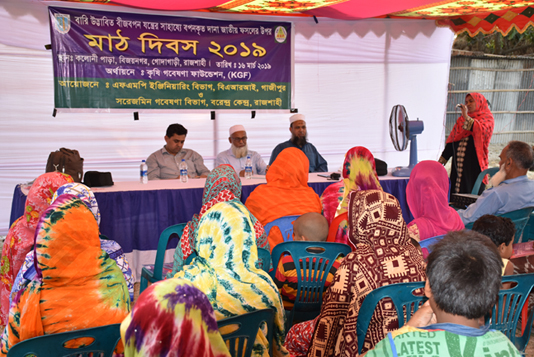RAJSHAHI, March 17, 2019 (BSS)- Agricultural scientists and researchers
urged the farmers to cultivate wheat by using seeder machine to boost yield
to meet its gradually mounting demand.
They said the machine developed by Bangladesh Agriculture Research
Institute (BARI) will also help lessening pressure on irrigation water for
the wheat farming side by side with minimizing the production cost in the
vast Barind tract.
They revealed this while addressing two separate farmers’ field day
meetings on projection of the seeder machine at Dhamdhum Badhair and
Bijoynagar Colonypara villages under Tanore and Godagari upazilas
respectively in the district on Saturday.
Farm Machinery and Post-harvest Process Engineering (FMPE) Division and On-
Farm Research Division (OFRD), Barind centre under BARI jointly organized the
meetings in association with Krishi Gobeshona Foundation (KGF). More than 160
farmers both male and females joined the programmes.
Principal Investigator and Chief Scientific Officer of FMPE Dr Ayub Hossain
and its Senior Scientific Officer Dr Arshadul Hoque addressed the meetings as
focal persons while Upazila Agriculture Officer Saifullah Ahmmed spoke as
special guest with Senior Scientific Officer of OFRD (Barind Centre) Dr
Shakhawat Hossain in the chair.
Dr Ayub Hossain opined that there is an enormous scope of increasing Rabi
crop in the region with minimum tillage and seeding method using residual
soil moisture. Thereby, pressure on groundwater can be reduced considerably
if wheat is cultivated instead of only Boro rice.
He opined that substantial and sustainable expansion of wheat farming can
mitigate the existing water-stress condition in the high Barind tract as
wheat is environment friendly crop.
Time has come to enhance acreage of wheat farming instead of only
depending on Irri-boro rice in the dried area to ensure food security amid
the adverse impact of climate change.
It can also prepare seedbed in one pass and sow seeds in line and cover
seeds at the same time. Planting cost of wheat, maize and rice is supposed to
be reduced by 57 to 78 percent compare to the conventional method.
Dr Ayub says minimum tillage of soil emits 44 percent less carbon dioxide
into the atmosphere which is also an environment friendly technology.
As a whole, adoption of BARI Seeder and its large scale use will ensure
sustainable crop production and safe environment in Barind area.



